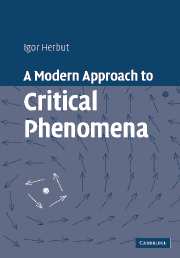Book contents
- Frontmatter
- Contents
- Preface
- 1 Introduction
- 2 Ginzburg–Landau–Wilson theory
- 3 Renormalization group
- 4 Superconducting transition
- 5 Near lower critical dimension
- 6 Kosterlitz–Thouless transition
- 7 Duality in higher dimensions
- 8 Quantum phase transitions
- Appendix A Hubbard–Stratonovich transformation
- Appendix B Linked-cluster theorem
- Appendix C Gauge fixing for long-range order
- Select bibliography
- Index
1 - Introduction
Published online by Cambridge University Press: 06 July 2010
- Frontmatter
- Contents
- Preface
- 1 Introduction
- 2 Ginzburg–Landau–Wilson theory
- 3 Renormalization group
- 4 Superconducting transition
- 5 Near lower critical dimension
- 6 Kosterlitz–Thouless transition
- 7 Duality in higher dimensions
- 8 Quantum phase transitions
- Appendix A Hubbard–Stratonovich transformation
- Appendix B Linked-cluster theorem
- Appendix C Gauge fixing for long-range order
- Select bibliography
- Index
Summary
Phase transitions are defined, and the concepts of order parameter and spontaneously broken symmetry are discussed. Simple models for magnetic phase transitions are introduced, together with some experimental examples. Critical exponents and the notion of universality are defined, and the consequences of the scaling assumptions are derived.
Phase transitions and order parameters
It is a fact of everyday experience that matter in thermodynamic equilibrium exists in different macroscopic phases. Indeed, it is difficult to imagine life on Earth without all three phases of water. A typical sample of matter, for example, has the temperature–pressure phase diagram presented in Fig. 1.1: by changing either of the two parameters the system may be brought into a solid, liquid, or gas phase. The change of phase may be gradual or abrupt. In the latter case, the phase transition takes place at well defined values of the parameters that determine the phase boundary.
Phase transitions are defined as points in the parameter space where the thermodynamic potential becomes non-analytic. Such a non-analyticity can arise only in the thermodynamic limit, when the size of the system is assumed to be infinite. In a finite system the partition function of any system is a finite sum of analytic functions of its parameters, and is therefore always analytic. A sharp phase transition is thus a mathematical idealization, albeit one that describes the reality extremely well. Macroscopic systems typically contain ∼ 1023 degrees of freedom, and as such are very close to being in the thermodynamic limit. The phase boundaries in Fig. 1.1, for example, for this reason represent reproducible physical quantities.
- Type
- Chapter
- Information
- A Modern Approach to Critical Phenomena , pp. 1 - 22Publisher: Cambridge University PressPrint publication year: 2007



